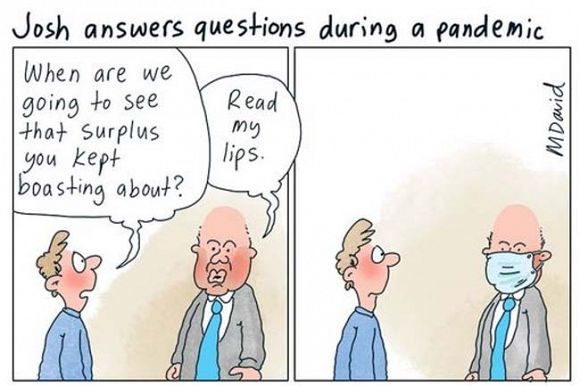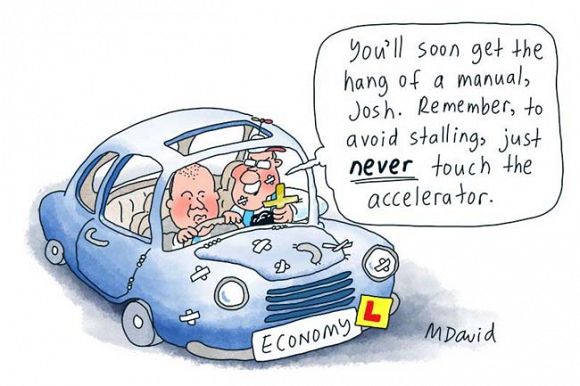The ABC continues to violate its charter by boosting one side of politics with false information, as Alan Austin reports.
THE ABC’S FLAGSHIP current affairs program, Insiders, included an intriguing exchange on Sunday 6 March. This helps explain why most Australians, according to opinion polls, erroneously believe the Coalition manages the books better than Labor.
Presenter David Speers announced authoritatively [46 minutes, 14 seconds]:
“We saw growth figures for the final three months of last year. They were strong — 3.4%. The Government is hoping to get the focus as much as they can onto the economy. It’s got a good story to tell in terms of growth and unemployment.”
This follows Speers enthusiastically endorsing the Morrison Government’s economic credentials on 7 November last year:
“The Prime Minister is urging us to move on and you can see where they want to spend the coming weeks and months... on the better news we are seeing on the economy. The Reserve Bank this week had some pretty rosy forecasts... roaring back to life, unemployment dropping back to 4%, steady increase in wages.”
There was no detailed discussion of the economy in last Sunday’s program, but guest Amy Remeikis managed to quote in passing the Liberal Party’s constant talking point about Australia's economy being “one of the strongest in the world”.
Actual economic growth lagging badly
The Government does not have a good story to tell about economic growth or jobs. Nor on wages. That quarterly figure of 3.4% growth in gross domestic product (GDP) announced in this month’s ABS national accounts is poor, given the recent past.
Yes, 3.4% quarterly growth would be fine in normal times. But this outcome follows negative 1.9% in the September quarter, negative 0.3% in March 2020, the appalling negative 6.8% in June 2020 and flat numbers from 2017 to 2019.
To restore the economy, Australia really needed quarterly GDP growth in December of 5.4% and an annual rise of 6.2%. Minimum.
Given the strong global recovery from the COVID-19 recession and Australia’s booming exports, 6.2% annual was a reasonable expectation. That would have put Australia back into the OECD’s top ten, where it has historically been placed.
Greece, Hungary and Poland expanded more than 7% in December. Israel, Estonia, Croatia and Turkey advanced more than 8%. Columbia, Slovenia and Malta surged more than 10%.
In contrast, Australia’s annual growth was just 4.2%, ranking 28th in the OECD, close to the lowest ever. That is not a good story.
Dismal employment data
Similarly, on jobs, the reality is disappointing. Yes, the headline 4.2% jobless looks satisfactory. But several unusual contingencies distort the picture.
First, the collapse in migration has reduced the number of people with jobs and without jobs. So while this has generated lower jobless rates, it has also led to record job vacancies and lower productivity.
Second, low average hours worked per month makes the jobs market look healthier than it is. Hours worked per adult per month have historically stayed well above 86.
Between the restructure of the economy in the 1990s and the arrival of the current Coalition, the lowest average hours in any calendar year was 85.6 in 2001. That was during the early 2000s global recession. Not bad. The lowest annual average through the Global Financial Crisis was 86.8 in 2009. Impressive.
This measure has since collapsed badly, tumbling to 84.8 in 2016 and just 81.9 in 2020. The latest monthly number, for January, was 79.4 — the lowest January figure on record.
Thirdly, we have seen the inexplicable expansion since 2015 in public service jobs by 464,000. That is 3.4% of the workforce. Yet, even so, Australia’s headline jobless rate of 4.2% ranks a lowly 15th in the OECD, lower than under any previous post-war government.
Press gallery in unison
On the 6 March program, the Insiders panel agreed with David Speers that the Coalition manages the economy better than Labor.
The Guardian’s Katharine Murphy said:
“I think you just described it. Obviously, the Government will point to the data.”
Network Ten’s Peter van Onselen went further:
“It’s a straight-up launch pad for the Election, just like last time. I guess that [Scott Morrison] hopes he can land it the way he did last time... It’s whether that works or not. And these things are not based on fact. They are usually based just on fiction.”
It is true that the Coalition’s economic reputation is based entirely on fiction, more so over the last eight years than ever before. Lists have been published here at IA and elsewhere of 50 economic outcomes since Scott Morrison became Treasurer which are the worst since records have been kept.
These include:
- the longest sustained retail slump;
- Australia’s deepest post-war recession;
- the deepest budget deficits;
- the greatest increase in gross debt since World War II;
- a record number of profitable companies paying no tax;
- the greatest waste of any government program ever;
- the lowest infrastructure investment as a percentage of GDP;
- the lowest rate of wages growth; and
- the first and only time household spending declined year on year.
Not all these occurred during the COVID-19 recession.
So why do so many experienced journalists, including some with the national broadcaster, spread the furphy of Coalition economic prowess? Do they actually believe it? Or do they accept Insiders is now the Liberal Party Hour? Either way, it is unhealthy for democracy.
Alan Austin is an Independent Australia columnist and freelance journalist. You can follow him on Twitter @alanaustin001.
Related Articles
- EXCLUSIVE: Morrison and Hunt's tricky denial of RAT requisitions
- ANALYSIS: No Morrison test requisitioning? We smell a RAT
- Will we survive the Morrison Government?
- EDITORIAL: Will we survive the Morrison Government?
- Morrison and Perrottet turn their backs on Australia's COVID crisis
 This work is licensed under a Creative Commons Attribution-NonCommercial-NoDerivs 3.0 Australia License
This work is licensed under a Creative Commons Attribution-NonCommercial-NoDerivs 3.0 Australia License
Support independent journalism Subscribe to IA.















